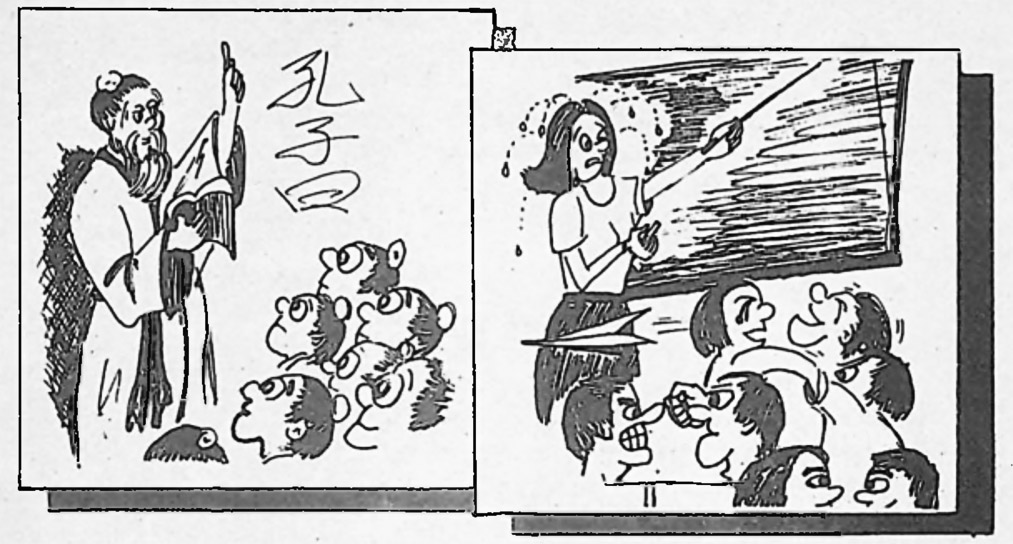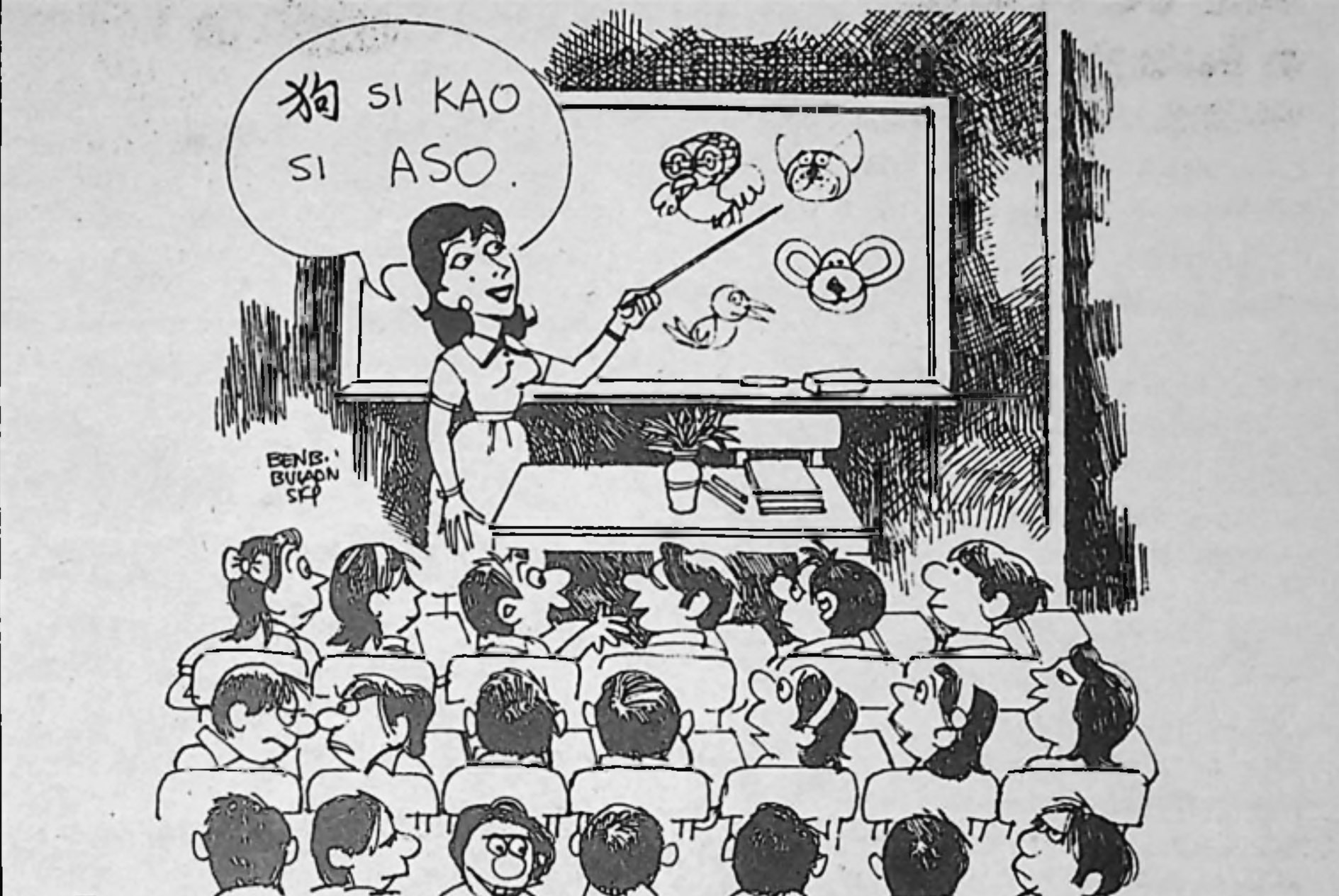First published in Tulay Monthly, Chinese-Filipino Digest 2, no.4 (September 17, 1989): 10.
On Sept. 28, the whole Chinese academic community pay tribute to the world’s best-loved and, at the same time, most-feared person – the moulder of youth, the shaper of young minds — the teacher.
During our time when we were mainly preoccupied with school, we always thought of our teachers as some kind of a god — supreme beings who hold the key to our happiness (if we get praises from our parents because of our high grades); and misery (if we get reprimanded for our poor grades). And most of the time, it’s misery.
In order not to get the irk of the gods, we have to put on our best behavior, memorize kilometric lines, and try to follow their orders, whims and caprices.
But oh, did we have a great time thinking of ways to outsmart and outwit our beloved teachers. And every time we had a chance, we’d only be too happy to tell and retell each and every story of smart escapades and playful pranks.
Many may not believe it, especially the young schoolers but these subjects of our woes, the Chinese teachers (meaning teachers who teach Chinese subjects, and not teachers who are Chinese), have tales of woes of their own to share.
“Teaching is probably the hardest of all professions. Aside from our main duty to educate the children, the responsibility to influence each child to become better citizens lies heavily on our shoulders,” a teacher-friend, Ms. Chua, who comes from a family of educators, told me.
Another woe of the teacher is the students apparent lack of interest in the Chinese subject. Many students could not grasp the importance of Chinese language and believe that it is more of a burden than an additional knowledge.
“We feel so helpless. Even if we tell them about the advantages, their environment (parents, friends and the place where they live) tells them otherwise. The students still perceive Chinese education as useless. Without the motivation to learn, the teachers’ cause is defeated even before the battle begins,” Chua said. “
Sometimes, it can really be frustrating. I tried every method I know of just to help a student understand the lesson. I sacrificed my time for him and tutored him free of charge. I even gave him a remedial test, still nothing. At times, l think that it is the educational system that is defective. Maybe the method of teaching is the culprit.”

In the present educational set-up, schools are beginning to hire new teachers hoping that the new sets of educators can bring in some new and innovative methods of teaching. But to no avail.
“Maybe bringing in young teachers isn’t a good idea. I observed that many of these young teachers are not really teachers by profession. Many of them are college students who take teaching as part-time jobs just because they excelled during high school. Not that I have anything against them, but many of them, are finishing college, will abandon their teaching jobs and pursue their chosen careers. The dedication to work, which I deem is important, is absent,” Chua continued.
Sadly, the herculean task of teaching is not even well-compensated. Normally, a Chinese teacher receives only around P2,000 to P2,500 monthly — not much for one who has a family to feed, clothe and educate.
Because of this, many of them make sidelines by tutoring and in many schools, the need for tutoring has become the rule, rather than the exception.
“Tutoring basically is not bad. But sometimes, the attention of a teacher-tutor will be focused on the tutoring session rather than on the classroom sessions, since the amount given to a tutor is much higher than the salary one gets as a teacher.”
The rate of tutoring plays around P350 per subject, and the tutor can have as many as 15 students as her tutoring wards.
Often, classroom teachers become negligent or lax in their teaching and deliberately relegate their main task to the tutors of their students.
“The prevalence of tutoring is a sign that the teacher as ‘teacher’ is incompetent. And that, I believe, is the greatest insult to a teacher. Some teachers I know even tutor their own students. Don’t they feel ashamed that such reflects their ineffective classroom teaching?” Chua fumed.
Compounding the problem of the inadequate pay is the acute lack of teachers. Come enrollment time, schools scramble to hire and pirate available teachers. Schools in the provinces are the hardest hit (quite a number have closed down due to lack of teachers). Other schools resorted to holding Chinese-language classes on alternate days.
Another alarming sign of the decline or Chinese education is that many students in high school do not even know how to conduct a simple conversation in straight Chinese. Many of them understand the language but find it very hard to verbalize their thoughts on simple situations.
“The method which is considered obsolete and useless is still being injected into the system — that is, learning by rote without understanding. Many teachers believe that the best way to learn is to memorize. And to be able to memorize a kilometric answer is the ticket to passing grades. Would you know that sometimes, when the question is rephrased a little, the students are lost because they memorized a particular answer to a particular question?”
“But, many schools are trying to employ new methods to teach Chinese more effectively. Some schools include a subject on current events where the students are taught to read and evaluate present events,” Chua said.
All in all, Chua concluded that the Chinese educational system relies heavily on the teachers. It is the teachers who should make the greatest effort, the greatest sacrifice to uplift the standard of education that young ones are entitled to – even if it means that they will lose their voices, get gray hairs, and develop varicose veins in their legs.
Teaching, after all, is the noblest of all professions.





